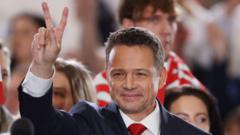In a tense Polish presidential election, Rafal Trzaskowski, the liberal mayor of Warsaw and member of the centrist Civic Platform (PO) party, has secured a narrow lead with 31.3% of the vote, but will face conservative historian Karol Nawrocki, who garnered 29.5%, in a decisive second-round election scheduled for June 1. Turnout for the election exceeded 67%. Trzaskowski's initial victory has ignited a mobilization campaign urging supporters to unite, stressing the urgency of reforming Poland's strict abortion laws and addressing judicial independence, which has been compromised during the previous government's tenure. Despite facing disappointment in not surpassing pre-election polling expectations, Trzaskowski remains optimistic and aims to rally further support from various political factions. Meanwhile, Nawrocki emphasizes the need to curb what he terms the monopolization of power by opposing parties, appealing to both conservative and far-right voters.
Warsaw's Mayor Trzaskowski Leads in Polish Presidential Election, Heads for Run-Off

Warsaw's Mayor Trzaskowski Leads in Polish Presidential Election, Heads for Run-Off
Warsaw's liberal mayor Rafal Trzaskowski inches ahead in a competitive presidential vote but faces stiff opposition in a necessary second-round election.
Trzaskowski's ability to secure his base and attract additional voters from rival candidates will be crucial, especially with the emergence of far-right candidates performing better than anticipated. The unpredictable dynamic of the electoral landscape puts extra pressure on both candidates as Poland inches toward a pivotal second-round vote.
As Polish voters gear up for a critical run-off, questions loom over candidate viability and potential alliances, making the upcoming weeks pivotal for the future of Poland’s governance. This election not only represents a clash of ideologies but also a referendum on the political landscape that has dominated Poland for the last two decades.
As Polish voters gear up for a critical run-off, questions loom over candidate viability and potential alliances, making the upcoming weeks pivotal for the future of Poland’s governance. This election not only represents a clash of ideologies but also a referendum on the political landscape that has dominated Poland for the last two decades.



















